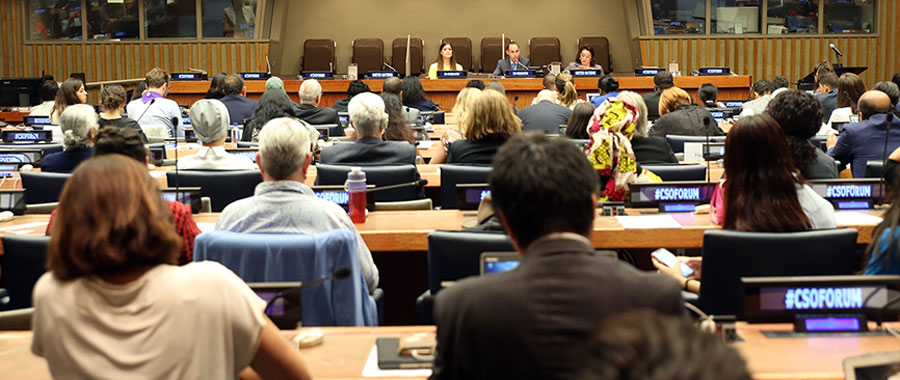The United Nations General Assembly (UNGA) Summit represents a critical arena for engaging with the complexities of modern global governance. Among the myriad of topics discussed, the role of civil society has emerged as a focal point of discourse, particularly within the context of Bahá’í teachings. The Bahá’í Faith advocates for the integration of diverse perspectives, recognizing the intrinsic value that civil society embodies in fostering inclusive dialogue, promoting social justice, and catalyzing profound societal change.
To comprehend the significant engagement of civil society at UNGA Summits, it is essential to explore the foundational principles that inform Bahá’í philosophy. Central to this understanding is the concept of consultation, a process that underscores the importance of collective decision-making. Bahá’í teachings encourage all members of society to contribute their insights, thus ensuring that a multitude of voices are represented in discussions that affect global policies and practices. This principle resonates deeply with the UN’s mission to enhance cooperation among nations while valuing the contributions from various stakeholders, including non-governmental organizations (NGOs) and grassroots movements.
The fascination surrounding the prominence of civil society at UNGA Summits can be attributed to several interwoven factors. Primarily, the increasing recognition of civil society’s unique ability to articulate the needs and aspirations of marginalized populations adds depth to the conversations held at these global forums. This recognition is not merely ceremonial; it reflects a profound understanding that governments alone cannot adequately address the multifaceted challenges of contemporary society. Civil society organizations often possess the grassroots connections necessary to unveil local realities, thereby enriching the dialogue at the United Nations.
Moreover, the involvement of civil society at UNGA Summits amplifies the voices of those typically relegated to the periphery. The Bahá’í teachings emphasize the oneness of humanity, which aligns with the UN’s commitment to upholding human rights and dignity for all. By providing a platform for civil society, the UN acknowledges the intertwining fates of individuals and communities, facilitating a shared responsibility towards achieving global peace and security. Such alignment fosters a more holistic approach to addressing pressing issues such as poverty, inequality, and climate change, ensuring that solutions are not only comprehensive but also sustainable.
The integration of civil society into the UN’s frameworks serves another pivotal purpose: fostering transparency and accountability. In a world where the gaps between policymakers and the populace can often appear insurmountable, civil society serves as an essential intermediary. Bahá’í teachings advocate for justice and the equitable distribution of resources, principles echoed in the UN’s sustainable development goals. By participating in UNGA Summits, civil society representatives hold governments accountable, urging them to adhere to their commitments and elevate the standards by which public officials are judged.
Additionally, civil society’s capacity to mobilize and innovate creates a dynamic interplay between grassroots activism and global policymaking. This is particularly evident in the realm of advocacy, where coalitions of civil society organizations converge to advance shared goals. The Bahá’í Faith’s emphasis on unity amidst diversity nurtures an environment ripe for collaboration among disparate groups, leading to multi-faceted strategies that address complex global phenomena. Such collaborative efforts enable the sharing of best practices and resources, ultimately enhancing the efficacy of initiatives and campaigns undertaken at various levels.
Furthermore, the rise of technology has altered the landscape of civil engagement, enabling unprecedented levels of communication and organization. Social media and digital platforms have transformed how civil society interacts with both the public and policymakers. The Bahá’í teachings, which encourage the use of modern tools for promoting social good, find a resonant application in this context. The ability to disseminate information widely and quickly empowers activists and organizations to not only participate in but also shape the narrative surrounding critical issues at the UNGA Summits.
Nevertheless, the role of civil society is not without its challenges. The dynamics of power—both within and across national borders—can complicate the engagement of civil society in UN discussions. Certain governments may view civil society as a threat, particularly when advocacy efforts challenge entrenched interests or expose systemic injustices. The Bahá’í teachings remind adherents of the need to engage in constructive dialogue, to approach even adversarial situations with a tilt towards reconciliation and understanding. By fostering a spirit of cooperation, civil society can play a pivotal role in mitigating tensions and promoting harmony in international relations.
Ultimately, the prominence of civil society at UNGA Summits reflects a broader philosophical commitment to pluralism and inclusivity espoused in Bahá’í teachings. As the global community grapples with existential challenges, the voices that emerge from civil society offer critical perspectives that enrich our understanding of complex social fabrics. The interplay between civil society and formal governance structures strengthens the mechanisms of global cooperation, ensuring that all voices have the opportunity to contribute to the symphony of human development.
In conclusion, the engagement of civil society at the United Nations General Assembly not only underscores its essential role in global governance but also affirms the ideals enshrined in Bahá’í teachings. By amplifying marginalized voices, fostering accountability, and nurturing collaborative approaches, civil society represents the vanguard of a new era in international relations—one where diversity is celebrated and collective engagement is paramount. This evolution heralds a profound opportunity for creating a more just and equitable world, firmly anchored in the belief that the power of humanity can be harnessed for the common good.
